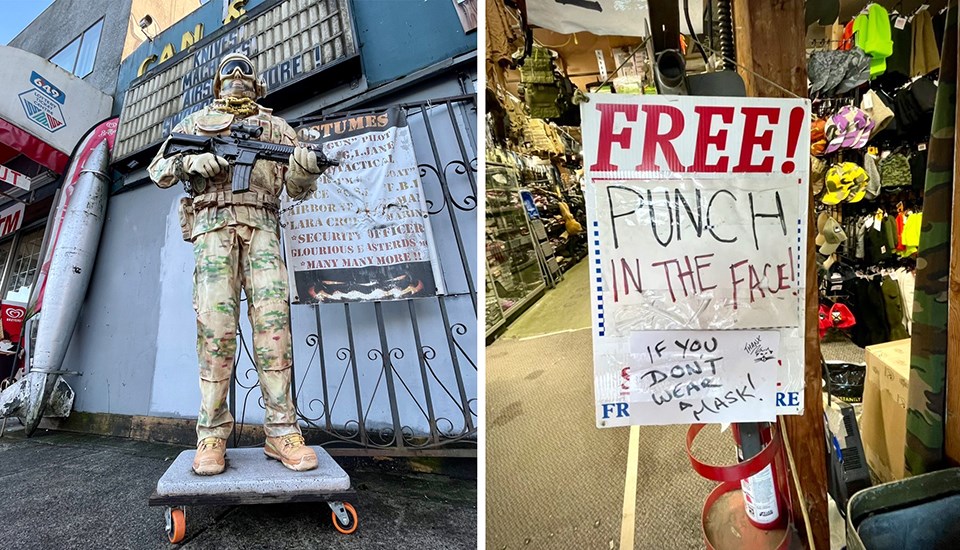A sign in a Vancouver army surplus store that says they offer a "free punch in the face" to people not wearing a face mask is bringing some much-needed levity to shoppers as our nerves become collectively more frayed during the pandemic.
Last week a person working at a grocery store was threatened with a meat cleaver after staff asked a man to wear a mask while shopping. Over the weekend a man was attacked with a knife in his elevator in the West End after another incident involving an alleged assailant not wearing a mask and being asked to put one on.
As more and more selfish freaks come out of the woodwork, the sign that greets you as you enter Gorilla Surplus on East Broadway offers a laugh for shoppers entering the store - and perhaps a small layer of protection for their staff as it may help ward off uncomfortable conversations between them and the public.
A little bit of history
The store has been operating since 1968, and its manager Mark Robson tells Vancouver Is Awesome that the humorous sign is a take on one that's been on display since the 1980s. The original one says "Free ride in a police car for shoplifters!"
When the mask mandate came into play early in the pandemic, the store put pieces of paper over the bottom part, with updated messaging.
Robson says that because of the nature of the store, some of its clientele are inclined to think that they believe the pandemic is "a hoax," to which he says: "We're not on board with that."
Will they actually punch you in the face if you walk in without a mask? Obviously not. Robson says no punches have been delivered to anti-maskers, and they won't ever be. He says most people get a laugh out of the sign, and that its purpose is "just a reminder to people that, you know, we need to stay safe."
Is it legal?
While the sign is hilarious, it does raise questions about what type of messaging you can and can't display at a place of business.
V.I.A. reached out to lawyer Kyla Lee, who tells us she "loves" this sign, and that it's perfectly legal for them to display it.
Lee tells us that it's technically a threat, "but given that it’s conditional on compliance with an existing law," and that it includes an element of humour and "wouldn't be taken seriously," that it's protected by freedom of expression.
Under the law, a threat is any type of communication that involves one person threatening another person with physical harm. Threats don't have to be communicated verbally, and they can be made through signs.
Lee says the difference, legally, between this and an illegal sign, "would really boil down to intent as well as what a reasonable person viewing the threat would perceive."
For a sign like this, between the humour element and the conditional nature, it likely wouldn't rise to the level necessary for criminal proof.
However, if it said "I will punch you in the face if you aren't wearing a mask," that's more direct, does not have humour, and is less conditional (i.e., conditioned on the entry of the unmasked person than the unmasked generally). That sort of sign could be construed as a threat.
Lee concludes: "Obviously there's a lot of nuances here, and the best legal advice is not to put out any signs suggesting violence but... I'm not perturbed by this sign at all."



